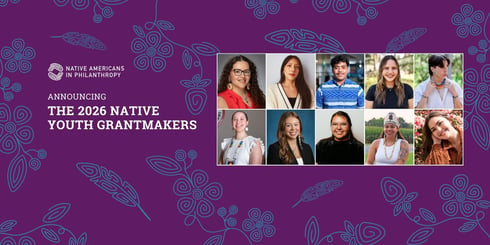Release of Women’s March Book "Together We Rise" to Benefit Native Non Profit Confronting Domestic Gender-Based Violence
Release of Women’s March Book "Together We Rise" to Benefit Native Non Profit Confronting Domestic Gender-Based Violence
(LOS ANGELES, CA) -- Native Americans in Philanthropy is proud to announce that a portion of the proceeds arising from the sale of TOGETHER WE RISE, the definitive oral and visual chronicle of the Women’s March in 2017, will benefit the National Indigenous Women's Resource Center (NIWRC), a Native non-profit working to address domestic violence and safety for Indigenous Women. This gift comes directly from Indigenous Women Rise, which is one of three women-led grassroots beneficiaries along with The Gathering for Justice, and Sistersong Women.
"As the one-year anniversary of the historic Women's March approaches, NIWRC is grateful for the funding from Indigenous Women Rise to assist us in our efforts to end violence against Native women. At NIWRC, an indigenous not for profit, we believe we are all related and that together, we can make great strides towards ending gender based violence in our Native communities. We are incredibly thankful and humbled by this contribution," stated Lucy Simpson (Navajo), Executive Director of NIWRC.
In January 2017, millions of women took to the streets in what became the largest protest in American history. Simultaneous marches across the country and around the globe saw women rise up in solidarity and demand to be heard. Through the efforts of Indigenous Women Rise, Native American women played a prominent role in the event, with over 1,000 women marching in DC and many others participating in sister marches across the country.
The book, released for the one-year anniversary of the March features original essays by prominent feminists and creatives such as America Ferrera, Roxane Gay, Ilana Glazer, and Jill Soloway, as well as esteemed Native thought leader Judith LeBlanc from Native Organizers Alliance. The book presents an unprecedented perspective into the origination, execution and movement resulting from this historic event. Indigenous Women Rise is also acknowledged in the book as one of the “extraordinary visionaries who helped create the Unity Principles”.
“Reflecting back to one year ago, I am so grateful to have been a part this collective of amazing indigenous leaders who came together to advocate and raise visibility for the issues Indigenous Women face at crisis level statistics,” said Sarah Eagle Heart (Oglala Lakota), CEO of Native Americans in Philanthropy, “Uncovering and channelling potential funding for Native non-profits is a critical part of our organization’s mission. We’re appreciative the Women’s March organizers were willing to recognize and include indigenous women, AND take a stand through the proceeds from this book, support one of the most pressing issues of violence against women affecting Indian country today.”
Inspired by the Obama HOPE poster that became a symbol for a movement, the team at Native Americans in Philanthropy developed the idea of a turquoise scarf utilizing the “Women Warrior” design by Bethany Yellowtail (Crow/Northern Cheyenne) to show unity and solidarity across all Indigenous Women who descended upon DC and nationally to have their voices heard.
ABOUT NATIONAL INDIGENOUS WOMEN’S RESOURCE CENTER
The National Indigenous Women's Resource Center, Inc. (NIWRC) is a Native nonprofit organization that was created specifically to serve as the National Indian Resource Center (NIRC) Addressing Domestic Violence and Safety for Indian Women. NIWRC advances culturally grounded, grassroots advocacy and to provide national leadership to ending gender-based violence in Indigenous communities through the development of educational materials and programs, direct technical assistance, and the development of local and national policy that builds the capacity of Indigenous communities and strengthens the exercise of tribal sovereignty.
ABOUT NATIVE AMERICANS IN PHILANTHROPY
Native Americans in Philanthropy (NAP) is a membership-based organization that promotes reciprocity and investment in, with and for Native peoples to build healthy and sustainable communities for all. All are welcome to join the NAP circle. Anyone and everyone who is interested in including Native peoples in creating deep and long-lasting impact, systemic and sustainable change in all of our communities.NAP is a powerful and growing network of Native and non-Native nonprofits, tribal communities, foundations and community leaders committed to engaging, learning and sharing resources and best practices grounded the Native tradition of reciprocity. Follow us on Facebook and LinkedIn at Native Americans in Philanthropy and on Twitter and Instagram @NativeGiving.
ABOUT WOMEN'S MARCH
Women's March is a women-led movement providing intersectional education on a diverse range of issues and creating entry points for new grassroots activists and organizers to engage in their local communities through trainings, outreach programs, and events. The mission of Women's March is to harness the political power of diverse women and their communities to create transformative social change. Women's March is committed to dismantling systems of oppression through nonviolent resistance and building inclusive structures guided by self-determination, dignity, and respect.
ABOUT INDIGENOUS WOMEN RISE
The Indigenous Women Rise (IWR) collective is comprised of a number of advocates including Advance Native Political Leadership, Native Americans in Philanthropy, Native Voice Network, Native Voices Rising, National Indian Women’s Resource Center, UltraViolet, The North American Region of the Continental Network of Indigenous Women of the Americas, Indigenous Environmental Network, and other key organizations working to advance Indigenous Peoples issues and rights. As the original protectors and strength of our country, the collective calls upon Indigenous women and people to rise with us to ensure that our voices on the issues that affect us all were resoundingly heard.



Comments